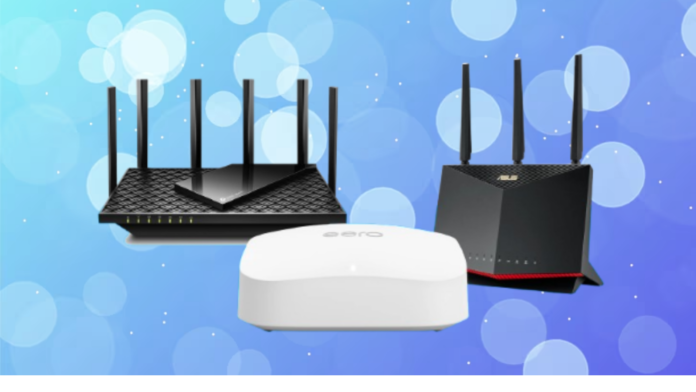People need to understand that why it is important to be aware of choosing the best router in 2026. The latest Wi-Fi 7 technology has been made available to users in 2026. You guys should be aware to choose the best router, their types, uses and which one is best for your use.
The guide introduces you to all major router types with their operational methods together with essential features to help you select the most suitable router for your requirements. We utilize specific examples and actual product characteristics together with modern industry developments to assist you with your decision-making process.
What Is a Router and Why It Matters in 2026
A router serves as a device that links your home or business equipment to both the internet and internal connections between devices. Also router controls network traffic to ensure continuous connectivity for all your devices, including phones, laptops, smart TVs, and gaming consoles, etc. Your network will experience performance problems because poor router quality creates slow internet connections and unstable connections and limits network range.
In 2026, routers offer users more services than internet sharing. They provide network security controls together with device prioritization functions and smart control capabilities which include parental controls and Quality of Service (QoS) and mesh networking. Your online experience will improve through proper router selection for your network needs.
Key Router Types in 2026
When you want to purchase a router, you must first select the appropriate router type. The following list shows the most frequently used router types which people commonly select. Each router type provides its own specific functions and benefits.
1. Single‑Band Routers

Single-band routers use only the 2.4 GHz frequency. The band provides extended range capabilities but users experience reduced speed because of increased interference from nearby devices such as microwaves.
- Best for: This is best for the small apartments, basic browsing and minimal streaming.
- Pros: Low cost, easy to setup.
- Cons: Very slower performance, limited bandwidth for many other devices.
Basic internet plans can use this type of internet connection. However, users who stream 4K video or play online games or use multiple devices should select another option.
2. Dual‑Band Routers
Dual-band routers operate on both 2.4 GHz and 5 GHz frequency bands. The 5 GHz band enables fastest communication but the other hand it experiences more interruptions and has reduced coverage compared to the 2.4 GHz band.
- Best for: all time for small to medium home uses.
- Pros: Better performance and speed.
- Cons: The system will experience performance issues during peak activity times.
This type has been the go‑to choice for many years. The system provides users with an effective combination of distance coverage and speed performance for their daily activities.
3. Tri‑Band Routers
Tri-band routers extend their coverage through additional 5 gigahertz frequencies or 6 gigahertz frequencies which Wi-Fi 6E and Wi-Fi 7 models support. This technology helps multiple users to connect without experiencing performance drops.
- Best for: Larger homes, offices, heavy streaming, and gaming.
- Pros: More bandwidth and fewer slowdowns.
- Cons: The product costs more than other available options.
These routers become optimal solutions for users who require fast internet speeds with their numerous linked devices.
4. Mesh Wi‑Fi Systems

Mesh networks use a main router along with one or more extra nodes to spread Wi-Fi across a large area. Each node boost your Wi‑Fi signal so there are no dead zones.
- Best for: Multi‑floor homes or wide spaces.
- Pros: The system provides uninterrupted movement and maintains dependable wireless connections.
- Cons: The system usually costs more than individual components.
People now choose mesh systems because these systems provide better coverage and maintain steady internet speed throughout the home.
5. Gaming Routers
Gaming routers assign network resources to support gaming systems. The system keeps your console or PC gaming running very smoothly.
- Best for: Xbox, PlayStation and PC gaming.
- Pros: Fast response and best performance.
- Cons: The product costs more than other available options.
These routers work best for you if your goal is to achieve competitive gameplay which requires minimal lag and rapid response times.
Important Features to Consider Before Buying
Router types provide essential knowledge yet router users need to understand main features which help them select their ideal router.
Wi‑Fi Standard (e.g., Wi‑Fi 6 vs Wi‑Fi 7)

The Wi‑Fi standard defines speed, range, and efficiency. The next Wi‑Fi standard after this Wi‑Fi 7 system will launch in 2026. The system enables faster data transmission while delivering improved performance to multiple simultaneous devices.
Wi‑Fi 7 delivers internet speeds which will remain relevant for the future particularly when used for streaming 8K video content and operating multiple smart home devices.
Bands and Frequency
Tri-band routers deliver superior performance when multiple users access the network simultaneously. The system operates through three Wi-Fi channels which include 2.4 GHz and 5 GHz and 6 GHz channels (which Wi-Fi 6E and Wi-Fi 7 use). More bands mean less signal congestion and faster performance for many users.
Coverage and Range
Large homes and buildings with multiple floors require routers which provide strong antenna signals or mesh networking capabilities. Mesh systems give better coverage by spreading the Wi-Fi throughout the space and getting rid of weak spots altogether.
Ports and Connectivity
The modem requires one Ethernet WAN port whereas multiple LAN ports will connect wired devices. Some routers provide USB ports which enable users to connect storage devices and printers.
Security Features
Network security holds significant importance across all networks. Modern routers comes with WPA3, that keeps your devices safe and secure from the hacking risks.
How to choose the Best Router in 2026
The decision process requires you to follow specific steps after you understand the equipment types and their available features.
- Identify Your Internet Plan Speed
Your router needs to match or exceed the speed of your internet plan. Your internet provider supplies 1 Gbps internet service so you should purchase a router which supports this speed or higher. - Access Your Hardware Plus Your Usage Needs
If your are watching 4k or 8k videos, then its best to choose Wi-Fi 7 or high end Wi-Fi 6 routers. - Determine Coverage Requirements According to Your Area
Homeowners need to use either mesh systems or multiple-antenna routers in order to achieve complete Wi-Fi coverage throughout their large homes. - Examine Security Features Together With System Updates
Select routers that offer WPA3 security and provide ongoing firmware maintenance. - Access Additional Router Capabilities
Streaming activities which use 4K or 8K video content require users to choose between Wi‑Fi 7 and premium Wi‑Fi 6E equipment. Dual-band Wi-Fi will deliver adequate performance for users who need to conduct basic web browsing activities.
5 FAQs (Frequently Asked Questions)
1. Which router type is best for a large house in 2026?
The best option for large homes is mesh Wi-Fi systems which deliver uninterrupted wireless service to all areas of the property.
2. How many Ethernet ports should a best router type have?
A dependable router requires one Ethernet WAN port and at least two LAN ports. The configuration enables you to make direct connections to vital devices which include PCs and smart TVs that need fast and stable internet connection.
3. Do routers need frequent updates?
Routers require regular firmware updates because they should receive updates as their security needs improvement and their software bugs require fixing and their new features become available. The router app requires users to check for updates through its settings page.
Conclusion
To select the optimal router for 2026 you need to learn about different router types and existing Wi‑Fi standards and your personal requirements and essential characteristics which include bands and coverage and security. The information you have gathered empowers you to select between basic routers and powerful gaming systems and extensive mesh networks with full confidence.




I think it’s crucial to also consider how Wi-Fi 7 will impact households with multiple devices. Will it really make a noticeable difference in connectivity, especially as more smart devices become standard? Curious to hear your thoughts!